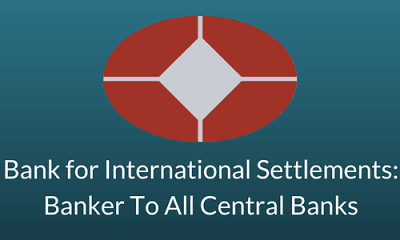
13 June 2017
In 2012 HSBC admitted to funding terrorism and laundering drug money for criminal networks. Why with an admittance of the above crimes has not one person gone to jail?
The answer comes in the form of immunity given out to banking cartel members.
Immunity comes from the Bank for International Settlements (BIS) and its Financial Stability Board, an operation that positions the banking cartel to the heights of a global monarch, with the power to sideline the laws and the sovereignty of nations under the legal guise of financial stability. To follow this legal framework and to then implement decisions, politicians are acting in treason against the people that elected them to serve the interests of the nation. This is the power of the banking cartel, overseen and steered by the BIS which issues forth all corporate legislation to be followed by corporations and banks. Governments today are themselves corporations without the general population having any idea of this fact, the people continue to believe that those they elect, have power.
Global Standards and Rules, or immunities afforded to the BIS, now extended to cities are as follows :
- Immunity of banks as corporations
- Immunity of bank officials carrying out official bank policy
- Immunity of documents
- Immunity of assets
A person or group of people who satisfy Blackstone’s criterion for ultimate sovereign power—the power to commit crimes with impunity—can’t exist in a nation where the law reigns supreme. And yet here we are a decade after the financial crisis began in earnest, and not one TBTF bank executive has gone to jail.
Barclays Traders Jailed In Global Interest Rate Setting Scandal But Not Executives
Legally, the TBTF banks are indistinguishable from the King, since the power to commit crimes with impunity swallows all other sovereign powers; such a power isn’t even supposed to exist in the U.S., and yet it does.
Moreover, since there can’t be two kings in a kingdom, the entire U.S. government, from the president on down, is just one of the King’s men under this formulation of power. The real job of the U.S. government, then, isn’t to represent the will of the people at all, it’s to do the King’s bidding. A nation that isn’t governed by law is governed by instead by a king—it’s one or the other—and the president’s inferiority to such an above-the-law sovereign was confirmed over 40 years ago with Nixon’s ouster. The president, unlike the King, answers to the law (despite Nixon’s opinion).
Now, you may say that while the TBTF banks might arguably have the de facto power of the King, that’s a far cry from wielding such power formally (i.e., having de jure criminal immunity).
The reply to that objection is set forth in this film, “All the Plenary’s Men,” which is a sequel to “The Veneer of Justice in a Kingdom of Crime.”
Another objection, raised by the DOJ itself, is that it HAS prosecuted TBTF bankers, citing cases like that of Raj Rajaratnam. These cases, however, in fact reveal the DOJ acting on behalf of the criminal global banking cartel.
On that score, the DOJ’s abysmal track record is by now so extensive and so thorough that its possible to spot legal patterns in the DOJ’s protracted miscarriage of justice, and, as you’re about to see, those patterns are very deeply disturbing indeed. What’s been going on cuts right past a garden variety constitutional crisis like Watergate straight to a crisis of sovereignty.
You see, prosecutors working on the HSBC case were actually going to indict the bank, but they got overruled, and HSBC and its team of criminals skated. The story of how exactly that reversal came about reveals, if not the King himself, then certainly many of the King’s top men.
Further Study
Comparisons between Bank of International Settlements, (BIS) guidelines pre WWII, with those of today
In Profile : Basel III
Origin of Central Banking and the Issuance of Credit
Basel Committee on Banking Supervision : dictating credit rating agency guidelines